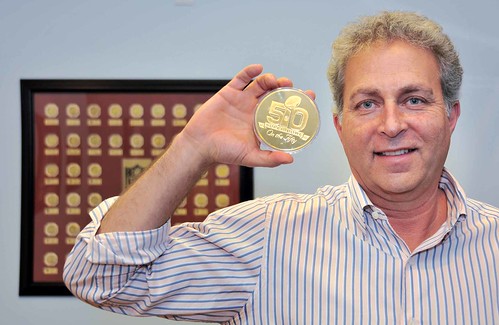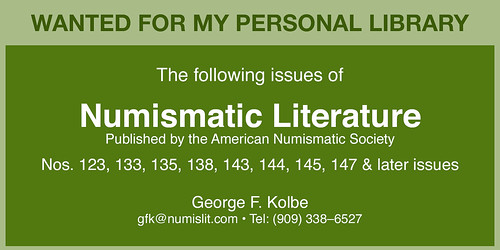
PREV ARTICLE
NEXT ARTICLE
FULL ISSUE
PREV FULL ISSUE
THE HIGHLAND MINT'S DARK SECRET
Here's an excerpt from a feature article published this week in BusinessWeek, titled The Super Bowl Coin Toss Has a Dark
Secret. -Editor

Michael Kott and the Super Bowl 50 coin For all the attention paid to the flip, what’s mostly unknown is the story of the company that for 23 years has made the coin itself—and will sell you a limited-edition replica, encased in acrylic along with a certificate of authenticity, for $99.99. Highland Mint operates out of a palm tree-ringed warehouse in Melbourne, Fla., and has been owned by Michael Kott, 58, since 1993. That’s the same year the NFL decided it wanted to turn a profit off the ceremony that started its biggest game. Highland Mint, then a small memorabilia seller, bought the exclusive license to create a collectible coin, and has since acquired licenses for framed photos and replica tickets for the other three major sports leagues, the NCAA, and events such as the Kentucky Derby. A tour of the mint in January finds some 120 employees in room after room, designing and constructing collectibles that are sold online and at retailers such as Bed Bath & Beyond and Neiman Marcus. In April 1993, Highland Mint was owned by a man named James Meadlock, and the company’s only products were licensed Major League Baseball memorabilia. Meadlock received an unsolicited call from Kott, who introduced himself as the owner of a Montreal-based collectible company called Madison Avenue Sports. According to a civil suit Meadlock would later file, Kott told Meadlock that he was interested in becoming Highland Mint’s sole Canadian distributor. Meadlock flew to Montreal to meet Kott and his father, Irving. According to the suit, the Kotts almost immediately offered to buy the entire company. Meadlock agreed to a simple deal. In exchange for Highland Mint, he accepted 120,000 shares in a company called Hariston, the parent of Madison Avenue Sports. The Kotts portrayed Hariston as a company on the rise. They told Meadlock that it owned a successful supermarket chain in Poland that would soon make a killing by expanding into other Eastern bloc countries in the post-Cold War gold rush. Even more enticing, according to Meadlock’s suit, was Hariston’s proprietary technology, which the Kotts claimed could turn contaminated groundwater into valuable precious metals, a process they said was already employed at a mine in Butte, Mont., and would eventually be used worldwide. The lawsuit Meadlock filed in Brevard County, Fla., in 1996, alleged that almost everything the Kotts told him wasn’t quite true. There were a few Polish grocery stores but no plans to expand. The groundwater cleanup technology was a bust in Butte. And Meadlock alleged that merchandise sold by Madison Avenue Sports had been artificially overvalued by a fake newsletter produced, in secret, by Madison Avenue Sports itself, and the company had been forced to buy back the products to pacify irate customers. (Irving Kott died in 2009. A motion to dismiss Meadlock’s suit was filed, but Michael Kott declined to comment on the matter.) Meadlock discovered that Irving, a Montreal native, was well-known to securities regulators around the world. By the time of their initial meeting in Montreal, the elder Kott had survived two assassination attempts, including a prematurely detonated car bomb, described in the Canadian press as mob-related, and had received what was then the largest civil fine in Canadian history, for stock fraud. Irving had also run what Dutch authorities described as the most successful boiler room in the world. According to FBI records, Irving first caught the attention of U.S. authorities in 1964, when he hosted a cocktail party in New York City to impress a mark who would later invest in a mining company secretly run by Irving. Thus began a pattern that would continue for the rest of Irving’s life. Shares in highly speculative companies sold by teams of brokers under his control would see their stock price rise spectacularly before falling off a cliff—classic pump-and-dumps. In 2004, Mark Cuban, the billionaire owner of the Dallas Mavericks, invested in a promising Canadian Internet company called Mamma.com. Shortly after, Switlyk and others told Cuban that Mamma was secretly controlled by Irving. Cuban sold his stock—a trade that led to his being accused of insider trading by the SEC in 2008. By the time Cuban won his case in 2013, Irving had died peacefully in his Montreal mansion. Inspired by his experience with Irving, Cuban started a fraud-focused website called Sharesleuth that recently made Michael’s Highland Mint a target, accusing the company in an article of selling footballs and helmets with forged signatures, including those of Seattle Seahawks quarterback Russell Wilson, for as much as $2,500 apiece. Michael Kott, as well as Michael Goldfarb, the president of Who’s Who Productions, a company that supplied the goods, say they’re legitimate. It can’t have been easy to run a small business for two decades with Kott for a last name. While his father was making enemies with the U.S. Attorney’s office and a billionaire reality TV star, Michael spent his time growing Highland Mint from nearly nothing into a leader in a market where authenticity is essential. So it’s understandable that Kott seems slightly uncomfortable with the idea of a visit from a reporter. “Is there any reason why you didn’t just call?” he says when I show up at the mint in January. Kott relaxes a bit once he starts answering questions about his company, its flagship product, and the Super Bowl. The company was on the verge of failure when he bought it, he says, with just 20 employees. This year he expects to produce 10,000 Super Bowl coins, and he’s rooting for Denver, unsentimentally, because he thinks Broncos fans will buy the most coins. It isn’t until after a tour of Highland Mint’s deafening factory floor that I mention Irving Kott. “I don’t really want to discuss that,” he says. Kott presents himself as simply a business owner who’s constantly reinventing his company. Under Meadlock, he says, Highland Mint’s main products were replica trading cards sold via “little ma-and-pop stores.” Now it’s his hunk of metal that will be tossed skyward for a global TV audience on Feb. 7. As far as Kott is concerned, there are coins to be made, a Super Bowl to attend, and a past to leave right there, in the past. Or, as he frames it before putting an abrupt end to the conversation, “The sins of the father have nothing to do with the son, right?” To read the complete article, see:

Wayne Homren, Editor The Numismatic Bibliomania Society is a non-profit organization promoting numismatic literature. See our web site at coinbooks.org. To submit items for publication in The E-Sylum, write to the Editor at this address: whomren@gmail.com To subscribe go to: https://my.binhost.com/lists/listinfo/esylum All Rights Reserved. NBS Home Page Contact the NBS webmaster 
|